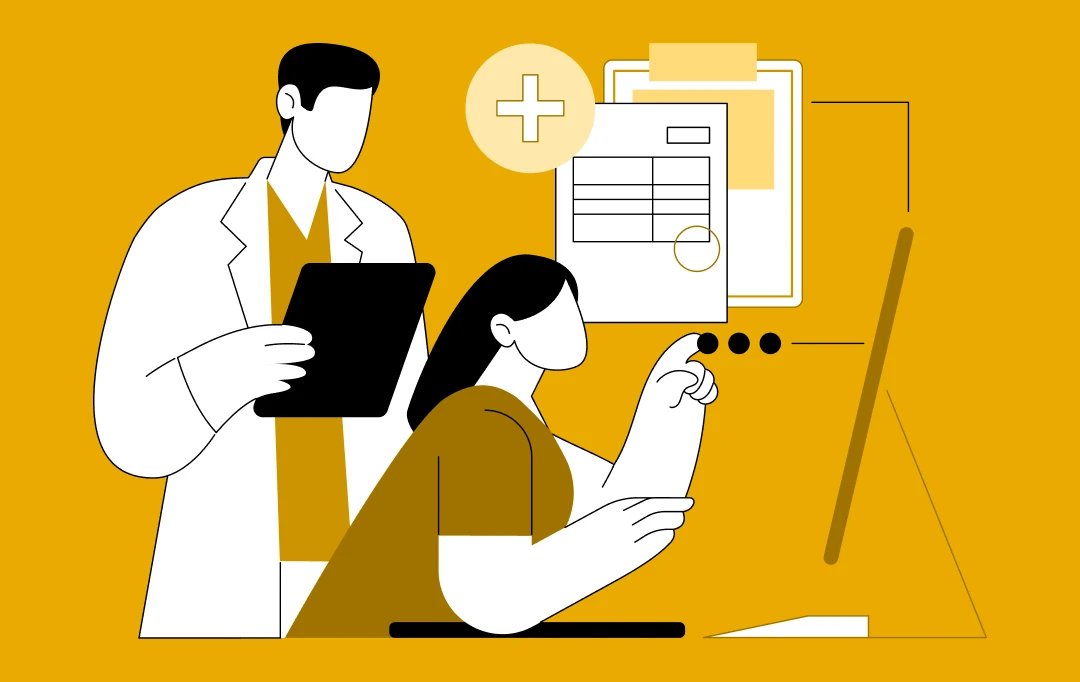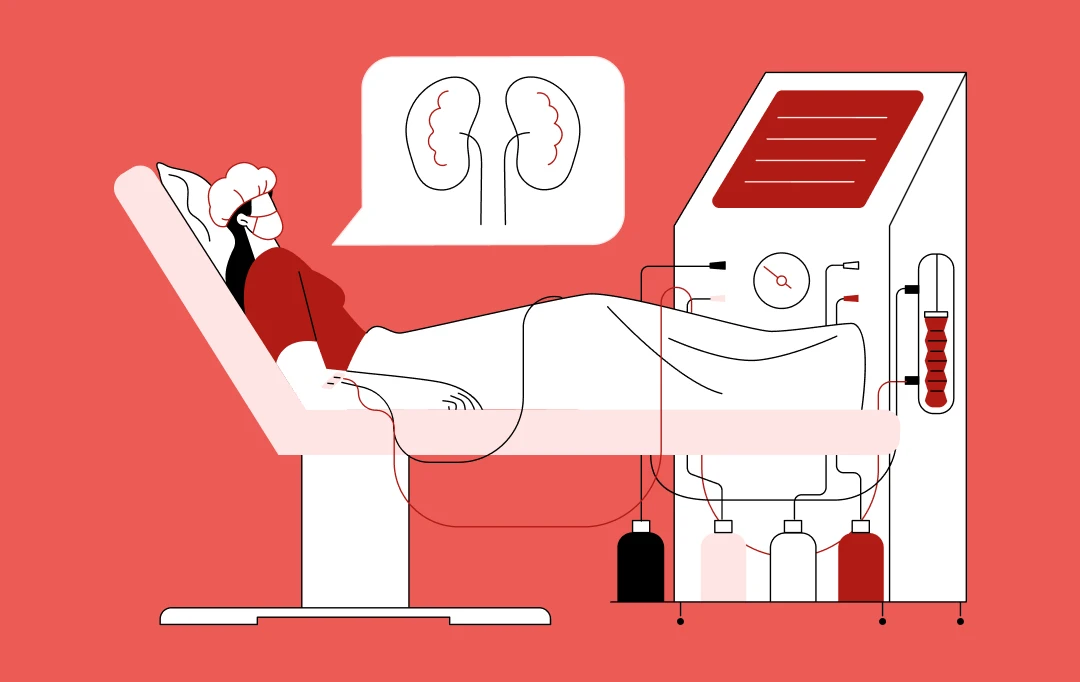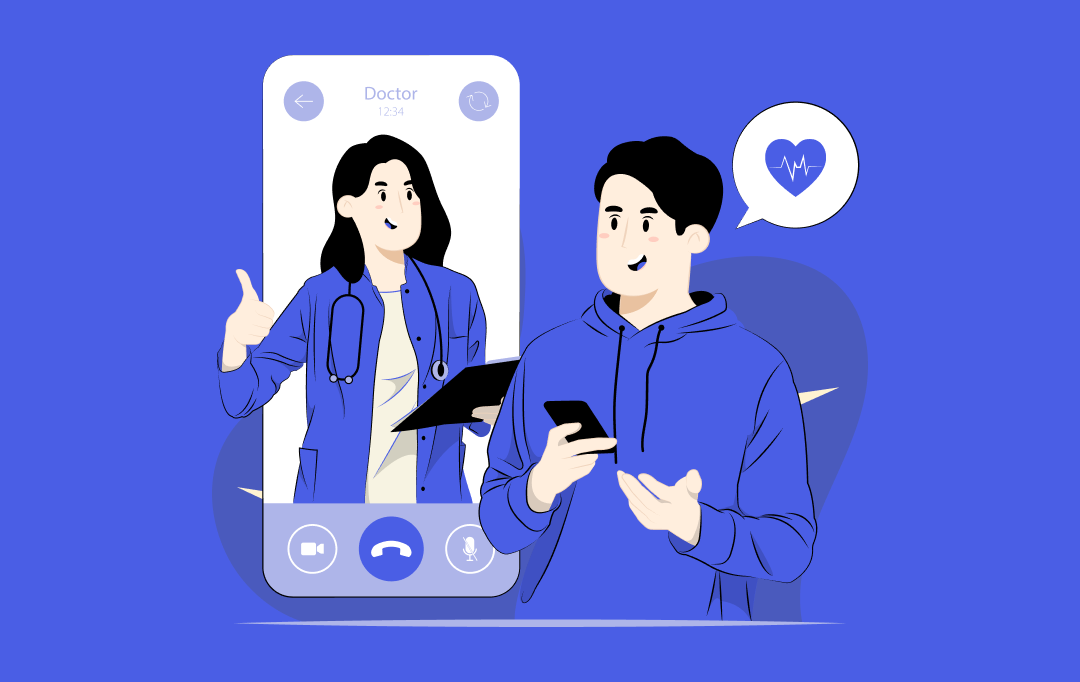- What is an EMR System in Healthcare?
- What is EHR in Healthcare?
- Top Applications of EMR Systems in Healthcare
- Centralized Patient Records
- Improved Documentation
- Telemedicine Integration
- Appointment Scheduling
- Data Sharing
- New Patient Integration
- Clinical Documentation
- Regulatory Compliance
- Clinical Decision Support
- Efficient Billing and Coding
- Advantages of EMR Software Development
- Saves space
- Improved prescription procedure
- User-Friendly
- Robust Data Security
- Streamlined Processes
- Increased Efficiency and Outcome
- Enhanced Communication
- Top Applications of EHR Systems in Healthcare
- Patient Records Management
- Interoperability and Data Exchange
- Patient Engagement and Empowerment
- Clinical Decision Support
- Population Health Management
- Advantages of EHR Software Development
- Quality Care
- Enhanced Coordination and Collaboration
- Comprehensive View of Patient Data
- Integration
- Enhanced Effectiveness
- Security
- EMR vs EHR: Key Differences
- EHR or EMR: What Should You Choose for Your Healthcare Business?
- Scope of Practice
- Interoperability and Data Exchange
- Scalability and Flexibility
- Why Appinventiv is the Right Choice for EMR and EHR Software Development
- FAQs
Technology has made our lives much easier and convenient. Today, we have different types of tech solutions to revolutionize almost every aspect of our lives, and healthcare is no exception.
Digital transformation in healthcare provides both patients and medical professionals with high-quality healthcare services. Now, users no longer need to wait for hours in a queue just to schedule an appointment with a physician. According to McKinsey, digital innovation will increase the healthcare sector’s overall valuation to $350-410 billion by 2025.
Undoubtedly, the healthcare sector is making a transformative shift from paper to digital records. Some of the most commonly used tech in healthcare are electronic medical records (EMR) and electronic health records (EHR).
With EMR and EHR software development, the health sector has witnessed unprecedented growth over the last decade. According to the National Electronic Health Records Survey, approximately 88.2% of office-based physicians use any EMR/EHR system, and around 77.8% adopt certified EMR/EHR systems.
These cutting-edge technologies provide healthcare practitioners and patients unparalleled accessibility to comprehensive medical data, facilitating informed decision-making and streamlined healthcare delivery processes with just a few taps.
While EHR and EMR software are often used interchangeably, they are specifically designed to serve different objectives, making it crucial to understand the nuances of EHR/EMR mobile app development before you choose one for your healthcare business.
So, without further ado, let’s delve into the intricacies of EMR vs EHR development, unraveling what EHR and EMR mean in healthcare. We will also discover their distinctive applications, benefits, and considerations associated with EHR and EMR differences so that you can make an informed decision.
What is an EMR System in Healthcare?
EMR, Electronic Medical Records, refers to digital versions of traditional paper health records. These digital records contain medical and treatment histories of patients within one healthcare organization. EMRs are designed to streamline the storage, retrieval, and updating of patient information. It provides healthcare professionals with a comprehensive view of a patient’s medical history, diagnoses, medications, treatment plans, immunization dates, allergies, laboratory test results, and other relevant data. Healthcare providers can quickly access patient information, reducing the risk of errors and enhancing communication among care teams.
In short, EMR systems in healthcare services offer a hub for interaction and care enhancement for all doctors, facilitating the execution of the highest quality of care. However, their functionality is typically limited to the internal operations of a single healthcare facility, making them ideal for practices with centralized patient care delivery models.
According to Future Market Insights, the global EMR market was valued at $17.6 billion in 2023 and is expected to reach a valuation of $32.3 billion by 2033, growing at a CAGR of 6.2% during the forecast period.

What is EHR in Healthcare?
EHR, Electronic Health Records, refers to computerized patient charts that give all the information about a patient, including their ailments, medical issues, and prescriptions. These real-time databases integrate patient information from various sources, including hospitals, clinics, laboratories, pharmacies, and other healthcare providers. Consequently, authorized users can easily access the necessary and accurate data.
Beyond clinical data, EHRs may also include additional features such as patient portals, telemedicine capabilities, and population health management tools. Also, EHR systems promote continuity of care, facilitate care coordination among disparate providers, and empower patients to actively participate in their healthcare journey.
They are specifically developed to give a much wider perspective of a patient’s healthcare and assist medical professionals in collecting critical information to make informed choices. Unlike EMR, EHR encompasses a broader scope of functionalities, facilitating interoperability and data exchange across multiple healthcare settings.
According to Statista, the global EHR market was valued at $29 billion in 2020 and is poised to cross the milestone of $47 billion by 2027.

Top Applications of EMR Systems in Healthcare
EMR software development has a wide range of applications across healthcare settings, facilitating various aspects of healthcare management and service provision:

Centralized Patient Records
EMR is a central hub for patient medical records, consolidating information from various sources such as clinical encounters, diagnostic tests, medications, and treatment plans.
Improved Documentation
These systems enable healthcare providers to electronically document patient encounters, including clinical notes, assessments, and treatment plans.
Telemedicine Integration
With the rise of telemedicine, EMR systems are increasingly being integrated with mHealth platforms to support virtual care delivery. This allows healthcare providers to conduct remote consultations, monitor patients’ health, and deliver care beyond traditional clinical settings.
Appointment Scheduling
EMR systems facilitate appointment scheduling by allowing healthcare providers to view availability, book appointments, and send regular reminders to patients.
Data Sharing
Electronic medical records facilitate seamless data sharing among healthcare providers, allowing authorized users to access patient information securely and accurately.
New Patient Integration
One major application of EMR systems in healthcare is streamlining the integration process of new patients. It captures their demographic details, medical history, insurance information, and any other relevant data.
Clinical Documentation
EMR systems offer comprehensive tools for clinical documentation, enabling healthcare providers to record patient encounters, assessments, diagnoses, and treatment plans in a structured and efficient manner.
Regulatory Compliance
Adhering to healthcare compliances is an integral necessity of the industry. EMR systems support organizations in meeting essential regulatory requirements and compliance by ensuring the security, confidentiality, and integrity of patient information.
Clinical Decision Support
EMR systems often include clinical decision support features that provide evidence-based guidelines, alerts, and reminders to assist healthcare providers in making informed clinical decisions.
Efficient Billing and Coding
Powered by artificial intelligence technology, EMR systems help automate billing and coding processes by capturing and coding clinical data in real-time. It helps streamline revenue cycle management, reduces administrative burden, and ensures accurate reimbursement for healthcare services rendered.
Advantages of EMR Software Development
EMRs offer numerous benefits over traditional paper records, including improved accuracy, accessibility, and efficiency. Here are some of the most notable ways EMR systems can benefit the healthcare industry:

Saves space
EMRs significantly reduce the physical storage requirements associated with paper-based medical records, freeing up valuable office space that can be repurposed for other essential functions. This not only contributes to a more organized and efficient workspace but also minimizes the costs and logistical challenges associated with managing paper records.
Improved prescription procedure
Electronic medical records feature a specialized filter designed to mitigate the risk of healthcare providers recommending treatments or medications with adverse side effects, prioritizing patient safety and leading to better health outcomes.
User-Friendly
EMRs are designed with user-friendly interfaces and intuitive navigation, making them accessible and easy to use for healthcare professionals across various specialties and levels of technical expertise. With features such as customizable templates and streamlined workflows, EMRs enhance usability, and overall patients’ satisfaction.
Robust Data Security
These medical record systems employ robust security measures to protect patient information, including encryption, access controls, audit trails, and regular data backups. By protecting sensitive medical data from unauthorized access, EMRs ensure compliance with privacy regulations and promote patient trust and confidentiality.
Streamlined Processes
EMR software development helps streamline administrative processes by centralizing patient information in electronic format, facilitating efficient information retrieval, reducing the risk of errors associated with manual record keeping, and supporting better communication among healthcare teams. This leads to improved workflow efficiency and organizational productivity.
Increased Efficiency and Outcome
EMR in healthcare is known to automate administrative tasks, streamline documentation processes, and reduce paperwork, allowing healthcare providers to spend more time on patient care rather than cumbersome paperwork. This increases clinical efficiency, improves patient throughput, and leads to better patient outcomes.
Enhanced Communication
These tech-advanced systems facilitate better communication among healthcare providers by providing a centralized platform for sharing patient information, test results, treatment plans, and other relevant data in real-time. This improves care coordination, enhances collaboration, and fosters a multidisciplinary approach to patient care.

Top Applications of EHR Systems in Healthcare
EHRs offer a wide range of uses and applications in healthcare settings. Let’s explore the various use cases of EHR systems in healthcare:

Patient Records Management
EHRs in healthcare serve as centralized repositories for managing comprehensive patient records, including medical history, diagnoses, medications, allergies, immunizations, lab results, and other relevant health information.
Interoperability and Data Exchange
Electronic health records facilitate interoperability and data exchange across multiple healthcare settings, allowing healthcare providers, hospitals, clinics, laboratories, pharmacies, and other stakeholders to access critical patient information anywhere, anytime.
Patient Engagement and Empowerment
Patient portals and health information exchange (HIE) are one of the most significant functionalities of EHR systems. This feature allows patients to access their health records, communicate with their healthcare providers, schedule appointments, and actively participate in their healthcare journey.
Clinical Decision Support
EHR systems offer clinical decision support tools, such as alerts, reminders, clinical guidelines, and evidence-based protocols, to assist healthcare providers in making informed decisions. This decision carries profound implications for operational efficiency, patient care, and overall business success.
Population Health Management
EHR systems in healthcare support population health management initiatives by aggregating and analyzing patient data to identify trends, patterns, and gaps in care. It empowers healthcare organizations to implement targeted interventions, improve preventive care, and enhance overall population health outcomes.
Advantages of EHR Software Development
Undoubtedly, having easy accessibility to a patient’s medical histories is advantageous for healthcare professionals in various ways. Let’s explore the myriad benefits of EHR in healthcare:

Quality Care
EHR facilitates faster access to patient information, leading to more effective care. This helps caregivers provide high-quality treatment, improve physician service quality, and assist with treatment efficacy. Additionally, patients have access to healthcare data, which gives them access to past medical data like blood test reports and radiology results, prescriptions, diagnostics, and much more.
Patients and doctors can connect by sharing remarks, messages, and even video chat. The portal allows both doctors and patients to keep tabs on a patient’s progress throughout treatment, making overall healthcare simpler and better.
Enhanced Coordination and Collaboration
By providing real-time access to patient data, these systems support care coordination and collaboration among healthcare providers, streamlining workflows across different care settings and specialties.
You may like reading: How AI Chatbots are Transforming the Healthcare Sector
Comprehensive View of Patient Data
EHR systems consolidate all patient data into a centralized electronic repository, ensuring that healthcare providers can access comprehensive and up-to-date information. This broad view enables more holistic and coordinated care, minimizing errors and improving treatment effectiveness.
For instance, Health e People partnered with us to create a comprehensive healthcare record platform where users can store all their medical data, find caregivers, and connect with people, making the extensive healthcare world a community. This data management platform benefits all—the users, caregivers, and researchers.

Integration
Medical practices can enhance care coordination by integrating EHR with other systems, such as DICOM medical imaging software, EMR, laboratory systems, pharmacy systems, and billing systems, allowing for efficient data exchange and interoperability. An EHR system that supports interoperability is crucial when patients need to see experts, manage serious illnesses like hypertension, or prepare to move into home care, resulting in more efficient and effective care delivery.
Also Read: Understanding the Impact of Home Healthcare Technology
Enhanced Effectiveness
EHR systems automate administrative tasks, such as appointment scheduling, chart documentation, and billing processes, freeing healthcare providers’ time to focus on patient care. By streamlining workflows and reducing paperwork, EHR systems improve efficiency, productivity, and resource utilization within healthcare organizations, leading to cost savings and operational improvements.
Security
Making sure your clinic complies with GDPR, HIPAA, and other essential regulations and that your patient information is secure is one of the key advantages of EHR software. These systems incorporate robust security measures to safeguard patient information against unauthorized access, data breaches, and cyber threats.
EMR vs EHR: Key Differences
Going through the discussion above, you would have noticed EHR and EMR in healthcare typically serve similar functions, yet refer to different concepts. To help you gain a better understanding of electronic health records vs electronic medical records, presented below is a concise table outlining the key differences between EHR and EMR systems:
| Aspects | EMR | EHR |
|---|---|---|
| Scope of Information | EMR is a digital version of patient medical information specific to a single healthcare organization or practice, focusing on clinical data such as medical history, diagnoses, medications, and treatment plans. | EHR is a digital record of all healthcare information across multiple settings. It includes medical history, allergies, demographics, medications, immunizations, laboratory results, radiology images, and more. |
| Portability | In the case of an EMR, one may need to print patient records as they are difficult to transport outside of the clinic. | EHR technology facilitates seamless mobility of patients’ medical records, allowing for effortless transfer to additional healthcare professionals and consultants. |
| Usability | EMRs are primarily used for diagnosis, treatment, and care within a single healthcare provider’s office. | EHRs are accessed by doctors for decision-making, diagnosis, and care outside of a single doctor’s office. |
| Integration | EMR focuses on internal integration within a single healthcare organization, with limited interoperability with external systems or providers. | These systems can be integrated with external systems, such as labs, pharmacies, imaging centers, and referring providers. |
| Data Sharing | EMRs typically limit data sharing to within the organization or practice, making it less effective for coordinating care across different providers. | EHRs are designed for comprehensive data sharing across different healthcare settings, improving care coordination and patient management. |
| Interoperability | EMRs have limited interoperability, often functioning independently within a single healthcare entity. | EHRs are built with interoperability in mind, enabling seamless data exchange between various healthcare systems and providers. |
EHR or EMR: What Should You Choose for Your Healthcare Business?
The decision to choose between EMR and EHR development for your healthcare business is a critical choice that requires careful consideration of various factors and informed decision-making. Here is a list of factors when evaluating EMR vs EHR for your business:

Scope of Practice
When choosing between EHR vs EMR, evaluate the specific needs and operational requirements of your healthcare business, considering factors such as your organization’s size, patient volume, specialty focus, and care delivery model. Determine whether your primary objective is to optimize internal clinical workflows within a single facility (EMR) or to achieve seamless data exchange and interoperability across multiple care settings (EHR).
Interoperability and Data Exchange
Assess the importance of interoperability and data exchange capabilities in supporting collaborative care delivery and information sharing within your healthcare ecosystem. Consider whether your organization needs to integrate with external systems, such as laboratories, pharmacies, imaging centers, and referring providers, to facilitate comprehensive patient care and improve care coordination.
Scalability and Flexibility
Consider the scalability and flexibility of the EMR or EHR solution to accommodate future growth, technological advancements, and evolving regulatory requirements. In order to choose between EHR vs EMR for your business, it’s always appropriate to go for a system that can adapt to changing needs and seamlessly incorporate new functionalities, such as telemedicine, remote monitoring, and predictive analytics, to enhance the value proposition for your organization and patients.
Why Appinventiv is the Right Choice for EMR and EHR Software Development
In today’s rapidly evolving healthcare landscape, the transition from paper-based record-keeping to digital solutions has become imperative for healthcare organizations seeking to enhance efficiency, improve patient care, and streamline operations. At the forefront of this digital transformation are EMR and EHR software development, which offer distinct functionalities and advantages.
However, developing scalable and secure EMR and EHR software that can adhere to all the regulatory requirements of healthcare sectors requires a strategic collaboration with an experienced healthcare software development company like Appinventiv.
We have a proven track record of delivering 3000+ successful projects, including 75+ for healthcare sectors. YouComm, Soniphi, and Health-e-People are some of our most esteemed clients who leveraged our healthcare software development services and experienced transformative outcomes in their operational processes.
Partner with us for EHR/EMR mobile app development and get an innovative solution for your healthcare business.
FAQs
Q. What is the difference between EMR and EHR?
A. Electronic Medical Records typically refer to digital versions of paper charts containing patients’ medical and treatment history within a single healthcare organization. EMRs focus on clinical data specific to a particular healthcare facility, such as medical history, diagnoses, medications, treatment plans, and laboratory results. They are designed to be used by healthcare providers within the same organization to document and track patient care.
On the other hand, Electronic Health Records perform each of these tasks and include a wide range of data beyond clinical information, such as demographics, medical history, allergies, medications, immunizations, laboratory results, radiology images, and more. They are designed to support interoperability and data exchange across different healthcare settings, facilitating coordinated care delivery and continuity of care.
In short, when it comes to differentiating EHR vs EMR, the latter focus on digital records within a single healthcare organization while EHRs provide a more comprehensive and interoperable view of a patient’s health information across multiple care settings and providers.
Q. Which is better, EHR or EMR?
A. EMR and EHR both serve as the foundation for future medical practice and facilitate effective data collection and processing. While both EMR and EHR are excellent choices, EHR adoption has surpassed EMR software development in various ways. This has enabled patients to take a more active role in the process, giving them more control over their clinical records.
However, when considering EMR vs EHR software development, you should evaluate your organization’s size and the needs of your organization to make an informed decision.
Q. How long does it take to develop an EHR/EMR software?
A. The development timeline for an EHR/EMR system in healthcare varies based on project complexity, features, customization, and the development team’s expertise. Typically, it can take anywhere from four months to a year or more to develop a fully functional EMR or EHR system in healthcare.
Q. How much does it cost to develop an EHR/EMR software?
A. The cost of developing an EHR or EMR software can vary significantly depending on various factors such as the list of features, customization requirements, regulatory compliance needs, integration with existing systems, and the location of EHR/EMR software developers.
On average, EHR/EMR mobile app development costs can range from $30,000 to $300,000 or more, depending on your unique project requirements. Contact our efficient healthcare software developers to get an accurate estimate for EHR and EMR software development costs and timelines based on your specific requirements.


- In just 2 mins you will get a response
- Your idea is 100% protected by our Non Disclosure Agreement.

Healthcare IT Outsourcing: Key Benefits, Best Practices, and Implementation Process
Key Takeaways Reduce Costs by 30-40%: Convert capital IT expenses to predictable operational costs, eliminating the need for large in-house teams and infrastructure. Focus on Core Patient Care: Free up internal resources from IT management to concentrate on core healthcare services, innovation, and growth. Ensure Compliance & Mitigate Risk: Leverage expert partners to navigate HIPAA…

How AI-Powered Virtual Health Assistants Are Enhancing Remote Patient Monitoring
Key takeaways: Remote patient monitoring has the potential to reduce hospital readmissions by up to a quarter, shifting healthcare from reactive to proactive care through continuous, real-time health tracking. The U.S. health intelligent virtual assistant market is expected to reach $1.87 billion by 2030, driven by the growing demand for continuous care, virtual consultations, and…

Why Telehealth Security is Non-Negotiable for Patient Trust and How to Achieve It
Key takeaways: Telehealth security is crucial for patient trust and the continued adoption of digital healthcare services. The rising tide of cyber threats, from ransomware to inadequate authentication, poses significant risks to patient data and provider reputation. Implementing robust security measures like end-to-end encryption, multi-factor authentication, and regular audits is non-negotiable. Compliance with regulations like…

















